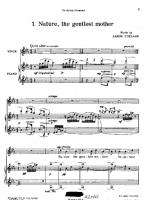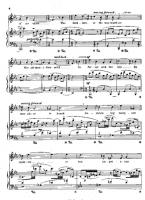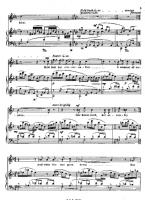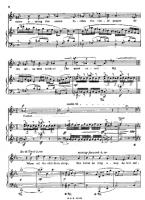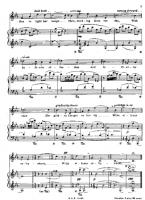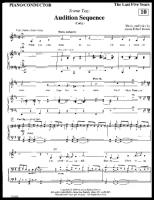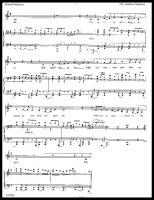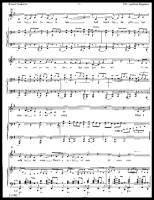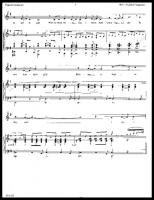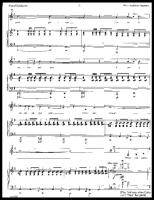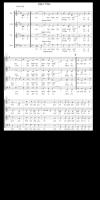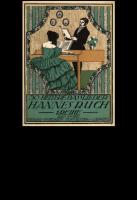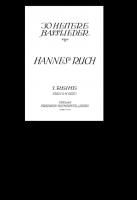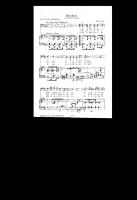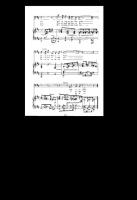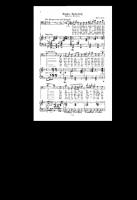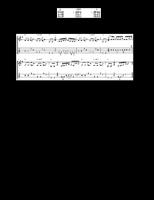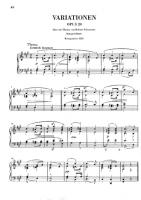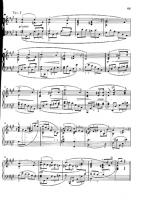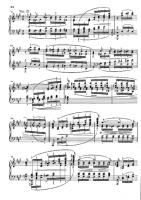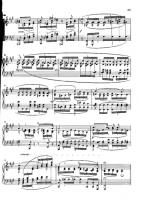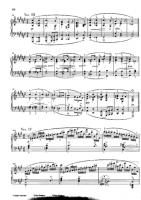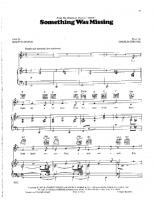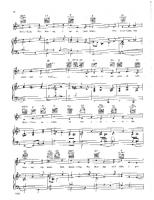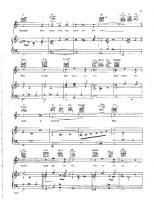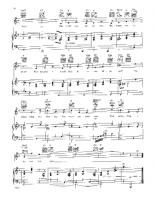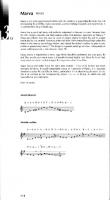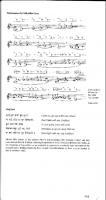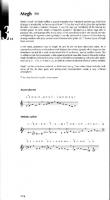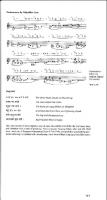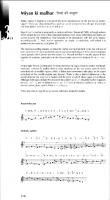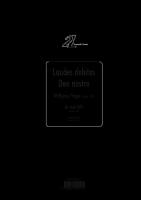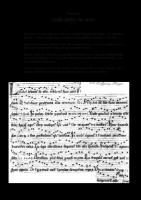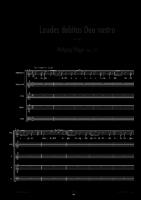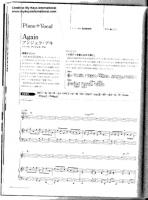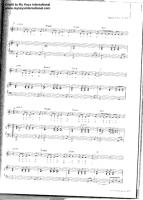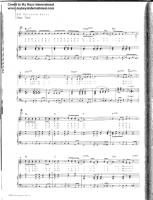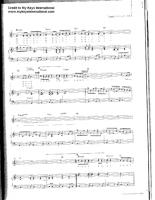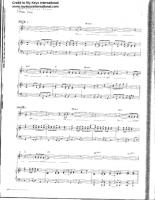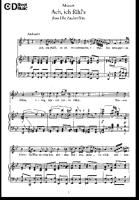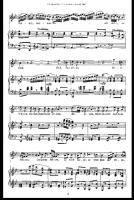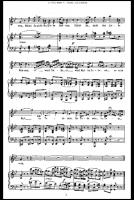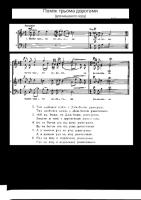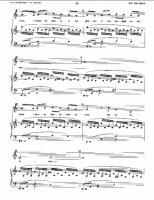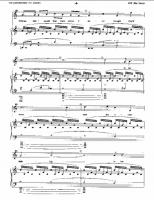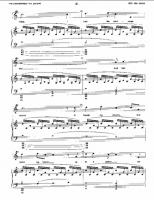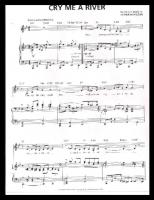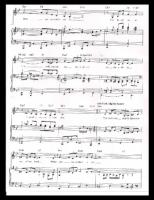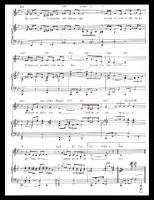Piano Sheet Music
 "I thought Eric Clapton was good. He still is. Not only is he good - he's rock's #1 guitarist, and he plays blues better than most of us" B.B. King - The King of the Blues
"I thought Eric Clapton was good. He still is. Not only is he good - he's rock's #1 guitarist, and he plays blues better than most of us" B.B. King - The King of the Blues
Joseph Kosma
 Joseph Kosma was a Hungarian-French composer. Date of birth: October 22, 1905, Budapest, Hungary Date and place of death: August 7, 1969, France
Joseph Kosma was a Hungarian-French composer. Date of birth: October 22, 1905, Budapest, Hungary Date and place of death: August 7, 1969, France
Kingdom Hearts
 Kingdom Hearts III is a 2019 action role-playing game developed and published by Square Enix for the PlayStation 4 and Xbox One. It is the twelfth installment in the Kingdom Hearts series, and serves as a conclusion of the "Dark Seeker saga" plot arc beginning with the original game.
Kingdom Hearts III is a 2019 action role-playing game developed and published by Square Enix for the PlayStation 4 and Xbox One. It is the twelfth installment in the Kingdom Hearts series, and serves as a conclusion of the "Dark Seeker saga" plot arc beginning with the original game.
Marc-André Hamelin
Marc-André Hamelin, OC, CQ (born September 5, 1961), is a Canadian virtuoso pianist and composer. Hamelin is recognized worldwide for the originality and technical proficiency of his performances of the classic repertoire. He has received 11 Grammy Award nominations.
Traditional
 traditional music
traditional music
Freddie Mercury
 Freddie Mercury (born Farrokh Bulsara, 5 September 1946 – 24 November 1991), was a British musician, best known as the lead vocalist of the rock band Queen. As a performer, he was known for his powerful vocals and flamboyant performances. As a songwriter, he composed many hits, including "Bohemian Rhapsody", "Killer Queen", "Somebody to Love", "Don't Stop Me Now", "Crazy Little Thing Called Love", "Barcelona", and "We Are the Champions". Led by Mercury, Queen had sold more than 300 million albums internationally by 2009.
Freddie Mercury (born Farrokh Bulsara, 5 September 1946 – 24 November 1991), was a British musician, best known as the lead vocalist of the rock band Queen. As a performer, he was known for his powerful vocals and flamboyant performances. As a songwriter, he composed many hits, including "Bohemian Rhapsody", "Killer Queen", "Somebody to Love", "Don't Stop Me Now", "Crazy Little Thing Called Love", "Barcelona", and "We Are the Champions". Led by Mercury, Queen had sold more than 300 million albums internationally by 2009.In addition to his work with Queen, he also led a solo career and was occasionally a producer and guest musician (piano or vocals) for other artists. Mercury, who was a Parsi and grew up in India, has been referred to as "Britain's first Asian rock star". He died of bronchopneumonia induced by AIDS on 24 November 1991, only one day after publicly acknowledging he had the disease. In 2006, Time Asia named him as one of the most influential Asian heroes of the past 60 years, and he continues to be voted as one of the greatest singers in the history of popular music. In 2005, a poll organised by Blender and MTV2 saw Mercury voted the greatest male singer of all time (and second-greatest singer overall after Mariah Carey). In 2009, a Classic Rock poll saw him voted the greatest rock singer of all time. In 2008, Rolling Stone ranked him number 18 on their list of the 100 greatest singers of all time, reflecting the magazine's editorial opinion.
Mehmet Ilgın
 Turkish musician and composer.
Turkish musician and composer.
Aaron Copland
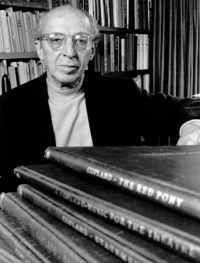 Aaron Copland (/ˈkoʊplənd/, KOHP-lənd; November 14, 1900 – December 2, 1990) was an American composer, composition teacher, writer, and later a conductor of his own and other American music. Copland was referred to by his peers and critics as "the Dean of American Composers". The open, slowly changing harmonies in much of his music are typical of what many people consider to be the sound of American music, evoking the vast American landscape and pioneer spirit.
Aaron Copland (/ˈkoʊplənd/, KOHP-lənd; November 14, 1900 – December 2, 1990) was an American composer, composition teacher, writer, and later a conductor of his own and other American music. Copland was referred to by his peers and critics as "the Dean of American Composers". The open, slowly changing harmonies in much of his music are typical of what many people consider to be the sound of American music, evoking the vast American landscape and pioneer spirit.
John Forster
 John Forster is an American cabaret musician, satirist, songwriter, composer, lyricist, and record producer. He has released several solo and collaborative albums, and has also worked on several revues and musicals.
John Forster is an American cabaret musician, satirist, songwriter, composer, lyricist, and record producer. He has released several solo and collaborative albums, and has also worked on several revues and musicals.
Bob Chilcott
 Robert "Bob" Chilcott (born 9 April 1955) is a British choral composer, conductor, and singer, based in Oxfordshire, England. He was a member of the King's Singers from 1985 to 1997, singing tenor. He has been a composer since 1997.Chilcott was born in Plymouth. He sang in the Choir of King's College, Cambridge, both as a boy and as a university student, when he conducted the voluntary Choral Society, which included many singers from other colleges. He performed the Pie Jesu of Fauré's Requiem on the 1967 King's College recording.
Robert "Bob" Chilcott (born 9 April 1955) is a British choral composer, conductor, and singer, based in Oxfordshire, England. He was a member of the King's Singers from 1985 to 1997, singing tenor. He has been a composer since 1997.Chilcott was born in Plymouth. He sang in the Choir of King's College, Cambridge, both as a boy and as a university student, when he conducted the voluntary Choral Society, which included many singers from other colleges. He performed the Pie Jesu of Fauré's Requiem on the 1967 King's College recording.
Ludwig van Beethoven
 Ludwig van Beethoven (/ˈlʊdvɪɡ væn ˈbeɪt(h)oʊvən/ (About this soundlisten); German: (About this soundlisten); baptised 17 December 1770 – 26 March 1827) was a German composer and pianist. A crucial figure in the transition between the classical and romantic eras in classical music, he remains one of the most recognized and influential musicians of this period, and is considered to be one of the greatest composers of all time.
Ludwig van Beethoven (/ˈlʊdvɪɡ væn ˈbeɪt(h)oʊvən/ (About this soundlisten); German: (About this soundlisten); baptised 17 December 1770 – 26 March 1827) was a German composer and pianist. A crucial figure in the transition between the classical and romantic eras in classical music, he remains one of the most recognized and influential musicians of this period, and is considered to be one of the greatest composers of all time.Beethoven was born in Bonn, the capital of the Electorate of Cologne, and part of the Holy Roman Empire. He displayed his musical talents at an early age and was vigorously taught by his father Johann van Beethoven, and was later taught by composer and conductor Christian Gottlob Neefe. At age 21, he moved to Vienna and studied composition with Joseph Haydn. Beethoven then gained a reputation as a virtuoso pianist, and was soon courted by Prince Lichnowsky for compositions, which resulted in Opus 1 in 1795.
Isaac Albeniz
 Isaac Albéniz i Pascual (Spanish pronunciation: ) (May 29, 1860 – May 18, 1909) was a Spanish pianist and composer best known for his piano works based on folk music.
Isaac Albéniz i Pascual (Spanish pronunciation: ) (May 29, 1860 – May 18, 1909) was a Spanish pianist and composer best known for his piano works based on folk music.Albéniz’ Suite Española Op.47 is comprised mainly of pieces written in 1886, and grouped together in 1887 in honor of the Queen of Spain. Like many of Albéniz' piano pieces, these works are miniature tone pictures of different geographical regions and musical idioms of Spain. The eight original titles are Granada, Cataluna, Sevilla, Cadiz, Asturias, Aragon, Castilla and Cuba but only the first three titles and Cuba appeared in the original collection. The other pieces were published in later collections, often with different titles. The publisher Hofmeister published all eight titles of Suite Espanola in 1911 after Albéniz’ death, appropriating other pieces for the other four titles so those pieces do not always accurately reflect the geographic designation of the titles, most obviously in the case of Asturias (Leyenda) whose Andalusian flamenco rhythms bear little resemblance to the music of the northern province Asturias. The opus number 47 assigned by Hofmeister has no relation to any chronological order in Albéniz’ oeuvre, in which opus numbers were randomly given by publishers or by Albéniz himself, with some pieces appearing in more than one collection.
David Wise
 David Wise (born 1967) is an English video game music composer and musician. He was a composer at Rare from 1985 to 2009, and was the company's sole musician up until 1994. He has gained a cult following for his work on various games, particularly Nintendo's Donkey Kong Country series. Wise is known for his atmospheric style of music, mixing natural environmental sounds with prominent melodic and percussive accompaniment.
David Wise (born 1967) is an English video game music composer and musician. He was a composer at Rare from 1985 to 2009, and was the company's sole musician up until 1994. He has gained a cult following for his work on various games, particularly Nintendo's Donkey Kong Country series. Wise is known for his atmospheric style of music, mixing natural environmental sounds with prominent melodic and percussive accompaniment.
Schumann
 Robert Schumann, sometimes given as Robert Alexander Schumann, (June 8, 1810 – July 29, 1856) was a German composer, aesthete and influential music critic. He is one of the most famous Romantic composers of the 19th century.
Robert Schumann, sometimes given as Robert Alexander Schumann, (June 8, 1810 – July 29, 1856) was a German composer, aesthete and influential music critic. He is one of the most famous Romantic composers of the 19th century.He had hoped to pursue a career as a virtuoso pianist, having been assured by his teacher Friedrich Wieck that he could become the finest pianist in Europe after only a few years of study with him. However, a hand injury prevented those hopes from being realized, and he decided to focus his musical energies on composition. Schumann's published compositions were, until 1840, all for the piano; he later composed works for piano and orchestra, many lieder (songs for voice and piano), four symphonies, an opera, and other orchestral, choral and chamber works. His writings about music appeared mostly in the Neue Zeitschrift für Musik ("The New Journal for Music"), a Leipzig-based publication that he jointly founded.
In 1840, after a long and acrimonious legal battle with his piano instructor Friedrich Wieck, Schumann married Wieck's daughter, pianist Clara Wieck, a considerable figure of the Romantic period in her own right. Clara Wieck showcased many works by her husband as well. For the last two years of his life, after an attempted suicide, Schumann was confined to a mental institution.
James A. Goins
 Here you will find the music, films, musicals, instrumental works and CD recordings of BMI songwriter and composer James A. Goins. Known for being a modern-day Renaissance man, James has established himself as an inventive and musically sensitive director of Theatre, Musicals, and Film. He is a freelance director whose credits include Of Mice and Men, Jesus Christ Superstar, Raisin in the Sun, Taming of the Shrew, Equus, 12 Angry Jurors and Proof just to name a few. His plays and musicals have been workshopped or produced at the Mark Taper Forum Annex, the Laity Theatre Company, New Musicals, Inc. and the Chameleon Theatre Circle. James brings a wealth of knowledge and experience to every project he works on.
Here you will find the music, films, musicals, instrumental works and CD recordings of BMI songwriter and composer James A. Goins. Known for being a modern-day Renaissance man, James has established himself as an inventive and musically sensitive director of Theatre, Musicals, and Film. He is a freelance director whose credits include Of Mice and Men, Jesus Christ Superstar, Raisin in the Sun, Taming of the Shrew, Equus, 12 Angry Jurors and Proof just to name a few. His plays and musicals have been workshopped or produced at the Mark Taper Forum Annex, the Laity Theatre Company, New Musicals, Inc. and the Chameleon Theatre Circle. James brings a wealth of knowledge and experience to every project he works on.
Janis Joplin
 Janis Lyn Joplin (/ˈdʒɒplɪn/; January 19, 1943 – October 4, 1970) was an American singer-songwriter who first rose to fame in the mid 1960s as the lead singer of the psychedelic/acid rock band Big Brother and the Holding Company, and later as a solo artist with her own backing groups, The Kozmic Blues Band and The Full Tilt Boogie Band.
Janis Lyn Joplin (/ˈdʒɒplɪn/; January 19, 1943 – October 4, 1970) was an American singer-songwriter who first rose to fame in the mid 1960s as the lead singer of the psychedelic/acid rock band Big Brother and the Holding Company, and later as a solo artist with her own backing groups, The Kozmic Blues Band and The Full Tilt Boogie Band.Her first ever large scale public performance was at the Monterey Pop Festival, which led to her becoming very popular and one of the major attractions at the Woodstock festival and the Festival Express train tour. Joplin charted five singles; other popular songs include: "Down on Me," "Summertime," "Piece of My Heart," "Ball 'n' Chain," "Maybe," "To Love Somebody," "Kozmic Blues," "Work Me, Lord," "Cry Baby," "Mercedes Benz," and her only number one hit, "Me and Bobby McGee."
Ray Hibbeler
 Ray Hibbeler, a prolific songwriter of the early-to-mid 20th century.
Ray Hibbeler, a prolific songwriter of the early-to-mid 20th century.
Nguyen Duy
 Nguyen-duy was born in Hue, Vietnam. Growing up within thirty kilometers of the demilitarized zone of the 18th Parallel, he describes hearing gunfire every day of his early life. In 1975 he immigrated to the United States as a political refugee.
Nguyen-duy was born in Hue, Vietnam. Growing up within thirty kilometers of the demilitarized zone of the 18th Parallel, he describes hearing gunfire every day of his early life. In 1975 he immigrated to the United States as a political refugee.Pipo has taken on many things in life in pursuit of his diverse interests. As a teenager in Vietnam, he competed as a national athlete in table tennis. He also spent some time during the mid 80’s living as a Buddhist monk in Northern India. In 1983 he earned a Bachelor of Arts degree in economics at Carleton College. He then moved to New York City, where he worked as a bartender and later as a nightclub manager. While living in the East Village in the 80’s, or as Pipo describes, “the crux of creativity in New York,” and meeting people such as musician Don Cherry and artist Keith Haring, Pipo’s interests turned to art. In 1992 he earned a Master of Arts in Photography, followed by a Master of Fine Arts in Photography in 1996, both from the University of New Mexico at Albuquerque.
J.Susa
 J.Susa composer.
J.Susa composer.
Mussorgsky
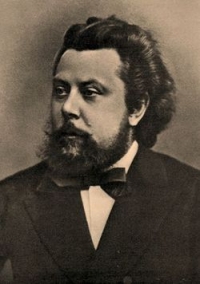 Modest Petrovich Mussorgsky (March 21, 1839 – March 28, 1881), one of the Russian composers known as the Five, was an innovator of Russian music. He strove to achieve a uniquely Russian musical identity, often in deliberate defiance of the established conventions of Western music.
Modest Petrovich Mussorgsky (March 21, 1839 – March 28, 1881), one of the Russian composers known as the Five, was an innovator of Russian music. He strove to achieve a uniquely Russian musical identity, often in deliberate defiance of the established conventions of Western music.Like his literary contemporary Fyodor Dostoyevsky, Mussorgsky depicts in his music "the insulted and the injured" with all their passion and pain. He raises these characters to tragic heights until the grotesque and majestic coexist. Mussorgsky could accomplish this not simply out of compassion or guilt towards them, but because in his works he almost becomes them. Mussorgsky's music is vivid, confused, feverish and ultimately hypnotizing —again, like Dostoyevsky at his best.
Many of his major works were inspired by Russian history, Russian folklore, and other nationalist themes, including the opera Boris Godunov, the orchestral tone poem Night on Bald Mountain, and the piano suite Pictures at an Exhibition. However, while Mussorgsky's music can be vivid and nationalistic, it does not glorify the powerful and is at times (such as in The Field-Marshal) antimilitaristic. For this reason, it was perceived as being directed against the state and its composer "under suspicion." He, like the others in The Russian Five, were considered dangerous extremists by the emperor and his court. This may have been the reason Tsar Alexander III personally crossed off Boris Godounov from the list of proposed pieces for the imperial opera in 1888.
For many years Mussorgsky's works were mainly known in versions revised or completed by other composers. Many of his most important compositions have recently come into their own in their original forms, and some of the original scores are now also available.
Amadeo Tommasi
 Tommasi started his career as a trombonist for a jazz band in Bologna. He gained notoriety in Italy for his performances on the radio show La coppa di jazz in 1960. The following year, he performed in the Sanremo Music Festival and received the First Prize at the Festival Bled in Slovenia. In the years following, he made recordings with Chet Baker, Bobby Jaspar, René Thomas, Buddy Collette, Conte Candoli, and Jacques Pelzer. In the early 1970s, he began composing music for films. In the film The Legend of 1900, he composed each of the recordings and also had a cameo appearance as a pianist. He also appeared in the 2010 documentary Pupi Avati, ieri oggi domani, directed by Claudio Costa.
Tommasi started his career as a trombonist for a jazz band in Bologna. He gained notoriety in Italy for his performances on the radio show La coppa di jazz in 1960. The following year, he performed in the Sanremo Music Festival and received the First Prize at the Festival Bled in Slovenia. In the years following, he made recordings with Chet Baker, Bobby Jaspar, René Thomas, Buddy Collette, Conte Candoli, and Jacques Pelzer. In the early 1970s, he began composing music for films. In the film The Legend of 1900, he composed each of the recordings and also had a cameo appearance as a pianist. He also appeared in the 2010 documentary Pupi Avati, ieri oggi domani, directed by Claudio Costa.
Porcupine Tree
 Porcupine Tree were an English progressive rock band formed by musician Steven Wilson in 1987. The band began essentially as a solo project for Wilson, who created all of the band's music. By late 1993, however, he wanted to work in a band environment, bringing on frequent collaborators Richard Barbieri as keyboardist, Colin Edwin as bassist, and Chris Maitland as drummer to form the first permanent lineup. With Wilson as lead vocalist and guitarist, this remained the lineup until February 2002, when Maitland left the band and Gavin Harrison was recruited to replace him.
Porcupine Tree were an English progressive rock band formed by musician Steven Wilson in 1987. The band began essentially as a solo project for Wilson, who created all of the band's music. By late 1993, however, he wanted to work in a band environment, bringing on frequent collaborators Richard Barbieri as keyboardist, Colin Edwin as bassist, and Chris Maitland as drummer to form the first permanent lineup. With Wilson as lead vocalist and guitarist, this remained the lineup until February 2002, when Maitland left the band and Gavin Harrison was recruited to replace him.
Irwin Levine
 Irwin Jesse Levine (March 23, 1938 – January 21, 1997) was an American songwriter, who co-wrote the song "Tie a Yellow Ribbon Round the Ole Oak Tree" with L. Russell Brown. The song was a worldwide hit for Tony Orlando and Dawn as it reached number one on both the US and UK charts for four weeks in April 1973 and number one on the Australian charts for seven weeks from May to July 1973. It was the top-selling single in 1973 in both the US and UK. In 2008, Billboard ranked the song as the 37th biggest song of all time in its issue celebrating the 50th anniversary of the Hot 100.
Irwin Jesse Levine (March 23, 1938 – January 21, 1997) was an American songwriter, who co-wrote the song "Tie a Yellow Ribbon Round the Ole Oak Tree" with L. Russell Brown. The song was a worldwide hit for Tony Orlando and Dawn as it reached number one on both the US and UK charts for four weeks in April 1973 and number one on the Australian charts for seven weeks from May to July 1973. It was the top-selling single in 1973 in both the US and UK. In 2008, Billboard ranked the song as the 37th biggest song of all time in its issue celebrating the 50th anniversary of the Hot 100.
Mark Mueller
 Mark Mueller is an American songwriter whose career spans pop music, television, film and stage. A two-time winner of the ASCAP Pop Award for writing one of the Most Performed Songs of the year, he’s had three Billboard Top Ten singles and one #1 Adult Contemporary hit. For his work in television, Mueller is the recipient of two Emmy nominations, both in the category of Outstanding Achievement in Music and Lyrics. Born in the Bay Area, Mueller now lives and works in Los Angeles, California.
Mark Mueller is an American songwriter whose career spans pop music, television, film and stage. A two-time winner of the ASCAP Pop Award for writing one of the Most Performed Songs of the year, he’s had three Billboard Top Ten singles and one #1 Adult Contemporary hit. For his work in television, Mueller is the recipient of two Emmy nominations, both in the category of Outstanding Achievement in Music and Lyrics. Born in the Bay Area, Mueller now lives and works in Los Angeles, California.
Abraham Chasins
 Abram Chasins was an American composer, pianist, piano teacher, lecturer, musicologist, music broadcaster, radio executive and author. Born in Manhattan, New York, he attended the Ethical Culture schools and undertook additional studies through the Columbia University Extension School
Abram Chasins was an American composer, pianist, piano teacher, lecturer, musicologist, music broadcaster, radio executive and author. Born in Manhattan, New York, he attended the Ethical Culture schools and undertook additional studies through the Columbia University Extension School
Beethoven
 Ludwig van Beethoven (16 December 1770 - 26 March 1827) was a German composer and pianist. He was a crucial figure in the transitional period between the Classical and Romantic eras in Western classical music, and remains one of the most respected and influential composers of all time.
Ludwig van Beethoven (16 December 1770 - 26 March 1827) was a German composer and pianist. He was a crucial figure in the transitional period between the Classical and Romantic eras in Western classical music, and remains one of the most respected and influential composers of all time.Born in Bonn, then in the Electorate of Cologne (now in modern-day Germany), he moved to Vienna in his early twenties and settled there, studying with Joseph Haydn and quickly gaining a reputation as a virtuoso pianist. Beethoven's hearing gradually deteriorated beginning in his twenties, yet he continued to compose masterpieces, and to conduct and perform, even after he was completely deaf.
Wicked
 Wicked is a musical with songs and lyrics by Stephen Schwartz and a book by Winnie Holzman. The story is based on the best-selling novel Wicked: The Life and Times of the Wicked Witch of the West by Gregory Maguire, a parallel novel of L. Frank Baum's classic story The Wonderful Wizard of Oz from the perspective of the witches of the Land of Oz.
Wicked is a musical with songs and lyrics by Stephen Schwartz and a book by Winnie Holzman. The story is based on the best-selling novel Wicked: The Life and Times of the Wicked Witch of the West by Gregory Maguire, a parallel novel of L. Frank Baum's classic story The Wonderful Wizard of Oz from the perspective of the witches of the Land of Oz.Wicked tells the story of Elphaba, the future Wicked Witch of the West and her relationship with Glinda, the Good Witch of the North. Their friendship struggles through their opposing personalities and viewpoints, rivalry over the same love-interest, their reactions to the Wizard's corrupt government, and, ultimately, Elphaba's public fall from grace. The plot is set mostly before Dorothy's arrival from Kansas, and includes several references to well-known scenes and dialogue in the 1939 film The Wizard of Oz.
The musical debuted on Broadway on October 30, 2003. It is produced by Universal Pictures and directed by Joe Mantello, with musical staging by Wayne Cilento. Its original stars were Idina Menzel as Elphaba, Kristin Chenoweth as Glinda, and Joel Grey as the Wizard. Although the production received mixed reviews and was panned by The New York Times, it has proved to be a favorite among patrons. The Broadway production's success spawned productions in Chicago, Los Angeles, London's West End, Tokyo, Melbourne, and Stuttgart, along with two North American tours that have visited over 30 cities in Canada and the United States.
The score of Wicked is heavily thematic, bearing in some senses more resemblance to a film score than a musical's score. While many musicals' scores develop new motifs and melodies for each song with little overlap, Schwartz integrated a handful of leitmotifs throughout the production. A cast recording of the original Broadway production was released on December 16, 2003, by Universal Music. All of the songs featured on stage are present on the recording with the exception of "The Wizard And I (Reprise)" and "The Wicked Witch of the East". The short reprise of "No One Mourns The Wicked" that opens Act II is attached to the beginning of "Thank Goodness". The music was arranged by Stephen Oremus, who was also the conductor and director, and James Lynn Abbott, with orchestrations by William David Brohn. The recording received the Grammy Award for Best Musical Show Album in 2005 and was certified platinum by the RIAA on November 30, 2006.
Ella Fitzgerald
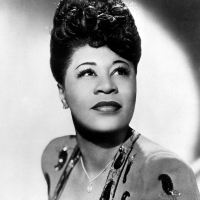 Ella Jane Fitzgerald (April 25, 1917 – June 15, 1996) was an American jazz singer sometimes referred to as the First Lady of Song, Queen of Jazz, and Lady Ella. She was noted for her purity of tone, impeccable diction, phrasing, intonation, and a "horn-like" improvisational ability, particularly in her scat singing. After a tumultuous adolescence, Fitzgerald found stability in musical success with the Chick Webb Orchestra, performing across the country but most often associated with the Savoy Ballroom in Harlem. Her rendition of the nursery rhyme "A-Tisket, A-Tasket" helped boost both her and Webb to national fame. After taking over the band when Webb died, Fitzgerald left it behind in 1942 to start her solo career.
Ella Jane Fitzgerald (April 25, 1917 – June 15, 1996) was an American jazz singer sometimes referred to as the First Lady of Song, Queen of Jazz, and Lady Ella. She was noted for her purity of tone, impeccable diction, phrasing, intonation, and a "horn-like" improvisational ability, particularly in her scat singing. After a tumultuous adolescence, Fitzgerald found stability in musical success with the Chick Webb Orchestra, performing across the country but most often associated with the Savoy Ballroom in Harlem. Her rendition of the nursery rhyme "A-Tisket, A-Tasket" helped boost both her and Webb to national fame. After taking over the band when Webb died, Fitzgerald left it behind in 1942 to start her solo career.
Jon English
 Jonathon James English (born 26 March 1949 in Hampstead, London, England) is an Australian rock singer, musician, actor and writer. Jon English emigrated to Australia with his parents in 1961. He was an early vocalist and rhythm guitarist for Sebastian Hardie but left to take on the role of Judas Iscariot in the Australian version of the stage musical Jesus Christ Superstar from May 1972, which was broadcast on television. English is also a noted solo singer, his Australian top twenty hit singles include "Turn the Page", "Hollywood Seven", "Words are Not Enough", "Six Ribbons" and "Hot Town".
Jonathon James English (born 26 March 1949 in Hampstead, London, England) is an Australian rock singer, musician, actor and writer. Jon English emigrated to Australia with his parents in 1961. He was an early vocalist and rhythm guitarist for Sebastian Hardie but left to take on the role of Judas Iscariot in the Australian version of the stage musical Jesus Christ Superstar from May 1972, which was broadcast on television. English is also a noted solo singer, his Australian top twenty hit singles include "Turn the Page", "Hollywood Seven", "Words are Not Enough", "Six Ribbons" and "Hot Town".English was acclaimed for his starring role in the 1978 Australian TV series Against the Wind - he won the TV Week Logie Award for 'Best New Talent in Australia'. He also co-wrote and performed the score with Mario Millo (ex-Sebastian Hardie). The series had international release, known as Mot alla vindar (1980) in Swedish, where both "Six Ribbons" and "Against the Wind" were released as singles, both singles and the soundtrack album peaked at #1 on the Norwegian charts; the first single, "Six Ribbons" and the album, peaked at #4 on the Swedish charts.
During 1983-1985, English won four Mo Awards with three consecutive 'Entertainer of the Year' awards and a further 'Male Vocal Performer' in 1985. English has performed in Gilbert and Sullivan's operettas The Pirates of Penzance, The Mikado and H.M.S. Pinafore from 1984. Performances of Essgee Entertainment's productions of the Gilbert and Sullivan trilogy from 1994 to 1997 were broadcast on Australian TV, they were all released on VHS and subsequently on DVD.
George Gershwin
 George Gershwin (September 26, 1898 – July 11, 1937) was an American composer. He wrote most of his vocal and theatrical works in collaboration with his elder brother, lyricist Ira Gershwin. George Gershwin composed songs both for Broadway and for the classical concert hall. He also wrote popular songs with success.
George Gershwin (September 26, 1898 – July 11, 1937) was an American composer. He wrote most of his vocal and theatrical works in collaboration with his elder brother, lyricist Ira Gershwin. George Gershwin composed songs both for Broadway and for the classical concert hall. He also wrote popular songs with success.Many of his compositions have been used on television and in numerous films, and many became jazz standards. The jazz singer Ella Fitzgerald recorded many of the Gershwins' songs on her 1959 Gershwin Songbook (arranged by Nelson Riddle). Countless singers and musicians have recorded Gershwin songs, including Fred Astaire, Louis Armstrong, Al Jolson, Bobby Darin, Art Tatum, Bing Crosby, Janis Joplin, John Coltrane, Frank Sinatra, Billie Holiday, Sam Cooke, Miles Davis, Herbie Hancock, Madonna, Judy Garland, Julie Andrews, Barbra Streisand, Marni Nixon, Natalie Cole, Patti Austin, Nina Simone, Maureen McGovern, John Fahey, The Residents, Than & Sam, Sublime, and Sting. A residential building is named after him on the Stony Brook University campus.
Count Basie
 Count Basie Jazz pianist William "Count" Basie is an American jazz pianist, organist and jazz orchestra conductor.
Count Basie Jazz pianist William "Count" Basie is an American jazz pianist, organist and jazz orchestra conductor.Date of birth: August 21, 1904, Red Bank, New Jersey, USA Date and place of death: April 26, 1984, Hollywood, Florida, USA Instrument: Piano; Organ
Michael Kamen
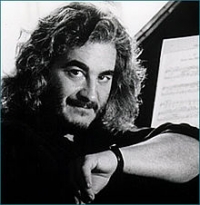 Michael Arnold Kamen was born in New York City, United States, the second of four sons. His father, Saul Kamen, was a dentist, and his mother, Helen, was a teacher. He was of Jewish heritage.
Michael Arnold Kamen was born in New York City, United States, the second of four sons. His father, Saul Kamen, was a dentist, and his mother, Helen, was a teacher. He was of Jewish heritage.While attending The High School of Music & Art in New York City, Michael Kamen became friends with Martin Fulterman (later known as Mark Snow, who composed the theme music for The X-Files among other projects). While studying the oboe, he formed a rock-classical fusion band called New York Rock & Roll Ensemble, together with classmates Fulterman and Dorian Rudnytsky along with Clifton Nivison and Brian Corrigan of Toms River, New Jersey. The group released five albums from 1968 to 1972 (Self-Titled, Reflections, Faithful Friends, Roll Over & Freedomburger). The group performed in white tie (not tuxedos), as typically worn by classical musicians. In the middle of the concert, Fulterman and Kamen would play an oboe duet. The group backed up friend and classmate Janis Ian in a concert at Alice Tully Hall in late 1967.
After graduating from high school, Kamen attended The Juilliard School, in Manhattan, New York City.
Hillsong United
 The Hillsong United band is an Australian rock and worship band, a part of Hillsong Church's youth ministry Hillsong United. Their music is a contemporary style of praise and worship tempered with mainstream rock.
The Hillsong United band is an Australian rock and worship band, a part of Hillsong Church's youth ministry Hillsong United. Their music is a contemporary style of praise and worship tempered with mainstream rock.Current members of the Hillsong United band include Jonathon Douglass (J.D.), Jadwin "Jad" Gillies, Holly Watson, Annie Garratt, Bec Gillies, and Michelle Fragar, daughter of Russell Fragar. Michael Guy Chislett plays guitar and Matthew Tennikoff plays bass guitar. Former original drummer Luke Munns made a transition from the drums to front the rock/indie band LUKAS. Popular New Zealand artist Brooke Fraser recently joined the band when she joined the church, first appearing on United We Stand.
The annual Hillsong United CD/DVD was recorded over many years during their October youth conference Encounterfest, with the album released in the first quarter of the following year. The 2007 album All of the Above was the first album to be fully studio recorded, containing videos of songs on the DVD. The band has toured in a number of countries, leading worship to thousands in North and South America, Europe and Asia.
Diana Krall
 Diana Jean Krall, (born November 16, 1964) is a Canadian jazz pianist and singer.
Diana Jean Krall, (born November 16, 1964) is a Canadian jazz pianist and singer.Krall was born into a musical family in Nanaimo, British Columbia, Canada. She began learning the piano at the age of four. In high school, she started playing in a small jazz group. When she was 15 she started playing regularly in several Nanaimo restaurants.
At age seventeen she won a scholarship from the Vancouver International Jazz Festival to study at the Berklee College of Music in Boston, and completed three terms.
In Nanaimo her playing attracted the attention of famed bass player Ray Brown (ex-husband of the late Ella Fitzgerald, long-time member of the Oscar Peterson Trio and Grammy-winning composer) and drummer Jeff Hamilton. After hearing her play, Brown and Hamilton persuaded Krall to move to Los Angeles, and study with pianist Jimmy Rowles, with whom she began to sing. This also brought her into contact with influential teachers and producers. In 1990, Krall relocated to New York.
Maroon 5
 Maroon 5 is a Grammy Award-winning American pop rock band. Formed with only two members at the French Woods Festival of the Performing Arts and expanded in Los Angeles, the group comprises five members: Adam Levine (lead vocals, rhythm guitar), James Valentine (lead guitar, backing vocals), Jesse Carmichael (keyboards, rhythm guitar, backing vocals), Mickey Madden (bass guitar), and Matt Flynn (drums, percussion).
Maroon 5 is a Grammy Award-winning American pop rock band. Formed with only two members at the French Woods Festival of the Performing Arts and expanded in Los Angeles, the group comprises five members: Adam Levine (lead vocals, rhythm guitar), James Valentine (lead guitar, backing vocals), Jesse Carmichael (keyboards, rhythm guitar, backing vocals), Mickey Madden (bass guitar), and Matt Flynn (drums, percussion).
Vinicius de Moraes
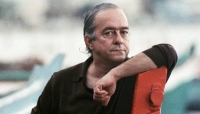 Marcus Vinicius da Cruz e Mello Moraes, also known as Vinicius de Moraes and nicknamed O Poetinha, was a Brazilian poet, lyricist, essayist, and playwright. He served as a diplomat, composed bossa nova music, and recorded several albums.
Marcus Vinicius da Cruz e Mello Moraes, also known as Vinicius de Moraes and nicknamed O Poetinha, was a Brazilian poet, lyricist, essayist, and playwright. He served as a diplomat, composed bossa nova music, and recorded several albums.
Jason Robert Brown
 Jason Robert Brown (born 1970 in Ossining, New York) is an American musical theater composer and lyricist. Often cited as one of the "New School" of theatrical composers (a list that includes Michael John LaChiusa, Adam Guettel, Andrew Lippa, and Jeanine Tesori, among others), Brown's music sensibility fuses pop-rock stylings with theatrical lyrics. An accomplished pianist, Brown has often served as music director, conductor, orchestrator and pianist for his own productions.
Jason Robert Brown (born 1970 in Ossining, New York) is an American musical theater composer and lyricist. Often cited as one of the "New School" of theatrical composers (a list that includes Michael John LaChiusa, Adam Guettel, Andrew Lippa, and Jeanine Tesori, among others), Brown's music sensibility fuses pop-rock stylings with theatrical lyrics. An accomplished pianist, Brown has often served as music director, conductor, orchestrator and pianist for his own productions.Ann Ronell
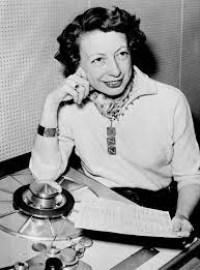 Ann Ronell (née Rosenblatt; December 25, 1905 — December 25, 1993) was an American composer and lyricist. She was best known for the standards "Willow Weep for Me" (1932) and "Who's Afraid of the Big Bad Wolf" (1933).
Ann Ronell (née Rosenblatt; December 25, 1905 — December 25, 1993) was an American composer and lyricist. She was best known for the standards "Willow Weep for Me" (1932) and "Who's Afraid of the Big Bad Wolf" (1933).
The Platters
 The Platters were a successful vocal group of the early rock and roll era. Their distinctive sound was a bridge between the pre-rock Tin Pan Alley tradition, and the burgeoning new genre. The original group members were Alex Hodge, Cornell Gunther, David Lynch, Joe Jefferson, Gaynel Hodge and Herb Reed.
The Platters were a successful vocal group of the early rock and roll era. Their distinctive sound was a bridge between the pre-rock Tin Pan Alley tradition, and the burgeoning new genre. The original group members were Alex Hodge, Cornell Gunther, David Lynch, Joe Jefferson, Gaynel Hodge and Herb Reed.After signing with Buck Ram, the act went through several personnel changes before hitting the charts, with the most successful incarnation comprising lead tenor Tony Williams, David Lynch, Paul Robi, Herb Reed, and Zola Taylor.
Hannes Ruch
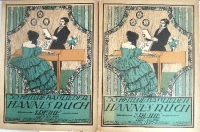 Hannes Ruch composer and author of music books.
Hannes Ruch composer and author of music books.
Lynyrd Skynyrd
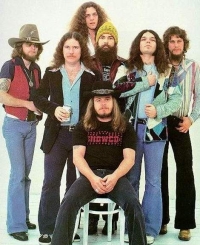 Lynyrd Skynyrd is an American Southern rock band. The band became prominent in the Southern United States in 1973, and rose to worldwide recognition before several members, including lead vocalist and primary songwriter Ronnie Van Zant, died in a plane crash in 1977 five miles northeast of Gillsburg, Mississippi. A tribute band was formed in 1987 for a reunion tour with Johnny Van Zant, Ronnie's younger brother, at the helm, and continues to record music today.
Lynyrd Skynyrd is an American Southern rock band. The band became prominent in the Southern United States in 1973, and rose to worldwide recognition before several members, including lead vocalist and primary songwriter Ronnie Van Zant, died in a plane crash in 1977 five miles northeast of Gillsburg, Mississippi. A tribute band was formed in 1987 for a reunion tour with Johnny Van Zant, Ronnie's younger brother, at the helm, and continues to record music today.The band was inducted into the Rock and Roll Hall of Fame on March 13, 2006, with members Gary Rossington and Billy Powell, former members Ed King, Bob Burns, and Artimus Pyle, and deceased members Ronnie Van Zant, Allen Collins, Steve Gaines, and Leon Wilkeson.
Clara Schumann
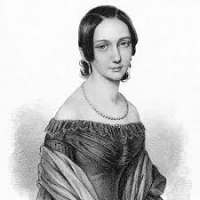 Clara Josephine Schumann (; née Wieck; 13 September 1819 – 20 May 1896) was a German pianist, composer and piano teacher. Regarded as one of the most distinguished pianists of the Romantic era, she exerted her influence over a 61-year concert career, changing the format and repertoire of the piano recital from displays of virtuosity to programs of serious works. She also composed solo piano pieces, a piano concerto (her Op. 7), chamber music, choral pieces, and songs.
Clara Josephine Schumann (; née Wieck; 13 September 1819 – 20 May 1896) was a German pianist, composer and piano teacher. Regarded as one of the most distinguished pianists of the Romantic era, she exerted her influence over a 61-year concert career, changing the format and repertoire of the piano recital from displays of virtuosity to programs of serious works. She also composed solo piano pieces, a piano concerto (her Op. 7), chamber music, choral pieces, and songs.
john powell
John Powell (born 18 September 1963) is an English composer, best known for his scores in motion pictures. He has been based in Los Angeles since 1997 and has composed the scores to over fifty feature films. Powell is best known for composing or co-composing scores for animated films, such as Antz (1998), The Road to El Dorado (2000), Chicken Run (2000), Shrek (2001), Robots (2005), the second three Ice Age films (2006-2012), the Happy Feet films (2006-2011), Dr. Seuss' Horton Hears a Who! (2008), the first two Kung Fu Panda films (2008–2011), Bolt (2008), the How to Train Your Dragon trilogy (2010–2019), the Rio films (2011-2014), Dr. Seuss' The Lorax (2012), and Ferdinand (2017).
Charles Strouse
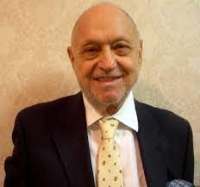 Charles Strouse (born June 7, 1928) is an American composer and lyricist best known for writing the music to such Broadway musicals as Bye Bye Birdie and Annie.Strouse was born in New York City, to Jewish parents, Ethel (née Newman) and Ira Strouse, who worked in the tobacco business. A graduate of the Eastman School of Music, he studied under Arthur Berger, David Diamond, Aaron Copland and Nadia Boulanger.[
Charles Strouse (born June 7, 1928) is an American composer and lyricist best known for writing the music to such Broadway musicals as Bye Bye Birdie and Annie.Strouse was born in New York City, to Jewish parents, Ethel (née Newman) and Ira Strouse, who worked in the tobacco business. A graduate of the Eastman School of Music, he studied under Arthur Berger, David Diamond, Aaron Copland and Nadia Boulanger.[
George F. Root
Chopin
 Frédéric Chopin (1 March 1810 – 17 October 1849) was a Polish composer and virtuoso pianist of the Romantic period. He is widely regarded as the greatest Polish composer, and ranks as one of music's greatest tone poets.
Frédéric Chopin (1 March 1810 – 17 October 1849) was a Polish composer and virtuoso pianist of the Romantic period. He is widely regarded as the greatest Polish composer, and ranks as one of music's greatest tone poets.He was born in the village of Żelazowa Wola, in the Duchy of Warsaw, to a Polish mother and French-expatriate father, and in his early life was regarded as a child-prodigy pianist. In November 1830, at the age of 20, Chopin went abroad; following the suppression of the Polish November Uprising of 1830–31, he became one of many expatriates of the Polish "Great Emigration."
In Paris, he made a comfortable living as a composer and piano teacher, while giving few public performances. A Polish patriot,
Chopin's extant compositions were written primarily for the piano as a solo instrument. Though technically demanding, Chopin's style emphasizes nuance and expressive depth rather than virtuosity. Chopin invented musical forms such as the ballade and was responsible for major innovations in forms such as the piano sonata, waltz, nocturne, étude, impromptu and prelude. His works are mainstays of Romanticism in 19th-century classical music.
Music theory
 Music theory is the study of the practices and possibilities of music. The Oxford Companion to Music describes three interrelated uses of the term "music theory"
Music theory is the study of the practices and possibilities of music. The Oxford Companion to Music describes three interrelated uses of the term "music theory"
Howard Shore
 Howard Leslie Shore (born October 18, 1946) is a Canadian composer, notable for his film scores. He has composed the scores for over 40 films, most notably the scores for The Lord of the Rings film trilogy, for which he won three Academy Awards. He is also a consistent collaborator with director David Cronenberg, having scored all but one of his films since 1979. Shore has also worked with Martin Scorsese, Jonathan Demme, David Fincher and many other filmakers.
Howard Leslie Shore (born October 18, 1946) is a Canadian composer, notable for his film scores. He has composed the scores for over 40 films, most notably the scores for The Lord of the Rings film trilogy, for which he won three Academy Awards. He is also a consistent collaborator with director David Cronenberg, having scored all but one of his films since 1979. Shore has also worked with Martin Scorsese, Jonathan Demme, David Fincher and many other filmakers.He has also composed a few concert works including one opera, The Fly, based on the plot (though not his score) of Cronenberg's 1986 film premiered at the Théâtre du Châtelet in Paris on 2 July 2008., a short piece Fanfare for the Wanamaker Organ and the Philadelphia Orchestra, and a short overture for the Swiss 21st Century Symphony Orchestra.
Shore is a three-time winner of the Academy Award, and has also won two Golden Globe Awards and four Grammy Awards. He is the uncle of film composer Ryan Shore.
Wolfgang Plagge
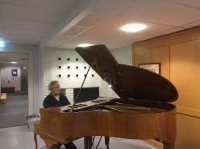 Wolfgang Plagge (born 23 August 1960 in Oslo, Norway by Dutch parents) is a Norwegian composer and pianist.
Wolfgang Plagge (born 23 August 1960 in Oslo, Norway by Dutch parents) is a Norwegian composer and pianist.Plagge started playing the piano as four years old, and made a sensational recital debut in the University Hall in Oslo, only twelve years old. He also started composing at an early age, had his first work published aged twelve, and is particularly renowned for his works for wind instruments. Despite a rheumatic disorder Plagge often occurs as pianist and has played with several leading orchestras. He has received several awards for his musical work. He has been performing as a soloist with a large number of orchestras in and outside of Norway, and has worked with internationally renowned artists like Ole Edvard Antonsen, Jens Harald Bratlie, Aleksandr Dmitriyev, Philippe Entremont, Lutz Herbig, Piotr Janowski, Evgeni Koroliov, Solveig Kringlebotn, Truls Mørk, Robert Oppenheimer, Robert Rønnes, Leif Segerstam, Randi Stene, Roberto Szidon, Lars Anders Tomter and Frøydis Ree Wekre.
W.A. Mozart
 Wolfgang Amadeus Mozart (German: , full baptismal name Johannes Chrysostomus Wolfgangus Theophilus Mozart (27 January 1756 – 5 December 1791), was a prolific and influential composer of the Classical era. He composed over 600 works, many acknowledged as pinnacles of symphonic, concertante, chamber, piano, operatic, and choral music. He is among the most enduringly popular of classical composers.
Wolfgang Amadeus Mozart (German: , full baptismal name Johannes Chrysostomus Wolfgangus Theophilus Mozart (27 January 1756 – 5 December 1791), was a prolific and influential composer of the Classical era. He composed over 600 works, many acknowledged as pinnacles of symphonic, concertante, chamber, piano, operatic, and choral music. He is among the most enduringly popular of classical composers.Mozart showed prodigious ability from his earliest childhood in Salzburg. Already competent on keyboard and violin, he composed from the age of five and performed before European royalty; at 17 he was engaged as a court musician in Salzburg, but grew restless and traveled in search of a better position, always composing abundantly. While visiting Vienna in 1781, he was dismissed from his Salzburg position. He chose to stay in the capital, where he achieved fame but little financial security. During his final years in Vienna, he composed many of his best-known symphonies, concertos, and operas, and the Requiem. The circumstances of his early death have been much mythologized. He was survived by his wife Constanze and two sons.
Mozart learned voraciously from others, and developed a brilliance and maturity of style that encompassed the light and graceful along with the dark and passionate—the whole informed by a vision of humanity "redeemed through art, forgiven, and reconciled with nature and the absolute." His influence on subsequent Western art music is profound. Beethoven wrote his own early compositions in the shadow of Mozart, of whom Joseph Haydn wrote that "posterity will not see such a talent again in 100 years."
Nobuo Uematsu
 Nobuo Uematsu (植松伸夫 Uematsu Nobuo?, born March 21, 1959) is a Japanese video game composer and musician, best known for scoring the majority of titles in the Final Fantasy series. He is regarded as one of the most famous and respected composers in the video game community. Uematsu is a self-taught musician; he began to play the piano at the age of eleven or twelve, with Elton John as his biggest influence.
Nobuo Uematsu (植松伸夫 Uematsu Nobuo?, born March 21, 1959) is a Japanese video game composer and musician, best known for scoring the majority of titles in the Final Fantasy series. He is regarded as one of the most famous and respected composers in the video game community. Uematsu is a self-taught musician; he began to play the piano at the age of eleven or twelve, with Elton John as his biggest influence.Uematsu joined Square (later Square Enix) in 1985, where he met Final Fantasy creator Hironobu Sakaguchi. They have worked together on numerous titles, most notably the games in the Final Fantasy series. After nearly 20 years in the company, he left Square Enix in 2004 and founded his own company called Smile Please, as well as the music production company Dog Ear Records. He has since composed music as a freelancer for video games primarily developed by Square Enix and Sakaguchi's development studio Mistwalker.
A handful of soundtracks and arranged albums of Uematsu's game scores have been released. Pieces from his video game works have been performed in concerts worldwide, and numerous Final Fantasy concerts have also been held. He has worked with Grammy Award-winning conductor Arnie Roth on several of these concerts. In 2002, he formed a rock band with colleagues Kenichiro Fukui and Tsuyoshi Sekito called The Black Mages, in which Uematsu plays the keyboard. The band plays arranged rock versions of Uematsu's Final Fantasy compositions.
Mozart
 Wolfgang Amadeus Mozart, full name Johann Chrysostom Wolfgang Amadeus Mozart (27 January 1756 â 5 December 1791) was a prolific and influential composer of the Classical era. His over 600 compositions include works widely acknowledged as pinnacles of symphonic, concertante, chamber, piano, operatic, and choral music. Mozart is among the most enduringly popular of classical composers, and many of his works are part of the standard concert repertoire.
Wolfgang Amadeus Mozart, full name Johann Chrysostom Wolfgang Amadeus Mozart (27 January 1756 â 5 December 1791) was a prolific and influential composer of the Classical era. His over 600 compositions include works widely acknowledged as pinnacles of symphonic, concertante, chamber, piano, operatic, and choral music. Mozart is among the most enduringly popular of classical composers, and many of his works are part of the standard concert repertoire.Mozart's music, like Haydn's, stands as an archetypal example of the Classical style. His works spanned the period during which that style transformed from one exemplified by the style galant to one that began to incorporate some of the contrapuntal complexities of the late Baroque, complexities against which the galant style had been a reaction. Mozart's own stylistic development closely paralleled the development of the classical style as a whole. In addition, he was a versatile composer and wrote in almost every major genre, including symphony, opera, the solo concerto, chamber music including string quartet and string quintet, and the piano sonata. While none of these genres were new, the piano concerto was almost single-handedly developed and popularized by Mozart. He also wrote a great deal of religious music, including masses; and he composed many dances, divertimenti, serenades, and other forms of light entertainment.
The central traits of the classical style can be identified in Mozart's music. Clarity, balance, and transparency are hallmarks of his work.
Mykola Leontovych
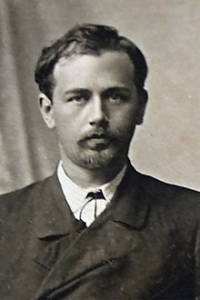 Mykola Dmytrovych Leontovych (Ukrainian: Микола Дмитрович Леонтович; sometimes spelt Leontovich; December 13 1877 – 23 January 1921) was a Ukrainian composer, choral conductor, and teacher of international renown. His music was inspired by Mykola Lysenko and the Ukrainian National Music School. Leontovych specialised in a cappella choral music, ranging from original compositions, to church music, to elaborate arrangements of folk music.
Mykola Dmytrovych Leontovych (Ukrainian: Микола Дмитрович Леонтович; sometimes spelt Leontovich; December 13 1877 – 23 January 1921) was a Ukrainian composer, choral conductor, and teacher of international renown. His music was inspired by Mykola Lysenko and the Ukrainian National Music School. Leontovych specialised in a cappella choral music, ranging from original compositions, to church music, to elaborate arrangements of folk music.
Alan Menken
 Alan Menken (born July 22, 1949 in New Rochelle, New York) is an American Broadway and an eight-time Academy Award winning composer and pianist. Menken has collaborated with several renowned lyricists including Howard Ashman (1950-1991), Tim Rice and Stephen Schwartz.
Alan Menken (born July 22, 1949 in New Rochelle, New York) is an American Broadway and an eight-time Academy Award winning composer and pianist. Menken has collaborated with several renowned lyricists including Howard Ashman (1950-1991), Tim Rice and Stephen Schwartz.
Frank Sinatra
 Francis Albert "Frank" Sinatra (December 12, 1915 â May 14, 1998) was an American singer and actor.
Francis Albert "Frank" Sinatra (December 12, 1915 â May 14, 1998) was an American singer and actor.Beginning his musical career in the swing era with Harry James and Tommy Dorsey, Sinatra became a solo artist with great success in the early to mid-1940s, being the idol of the "bobby soxers". His professional career had stalled by the 1950s, but it was reborn in 1954 after he won the Academy Award for Best Supporting Actor.
He signed with Capitol Records and released several critically lauded albums (such as In the Wee Small Hours, Songs for Swingin' Lovers, Come Fly with Me, Only the Lonely and Nice 'n' Easy). Sinatra left Capitol to found his own record label, Reprise Records (finding success with albums such as Ring-A-Ding-Ding, Sinatra at the Sands and Francis Albert Sinatra & Antonio Carlos Jobim), toured internationally, and fraternized with the Rat Pack and President John F. Kennedy in the early 1960s. Sinatra turned 50 in 1965, recorded the retrospective September of My Years, starred in the Emmy-winning television special Frank Sinatra: A Man and His Music, and scored hits with "Strangers in the Night" and "My Way".
Sinatra attempted to weather the changing tastes in popular music, but with dwindling album sales and after appearing in several poorly received films, he retired in 1971. Coming out of retirement in 1973, he recorded several albums, scoring a hit with "(Theme From) New York, New York" in 1980, and toured both within the United States and internationally until a few years before his death in 1998.
Sinatra also forged a career as a dramatic actor, winning the Academy Award for Best Supporting Actor for his performance in From Here to Eternity, and he was nominated for the Academy Award for Best Actor for The Man with the Golden Arm. His also starred in such musicals as High Society, Pal Joey, Guys and Dolls and On the Town. Sinatra was honored with the Kennedy Center Honors in 1983 and awarded the Presidential Medal of Freedom by Ronald Reagan in 1985 and the Congressional Gold Medal in 1997. Sinatra was also the recipient of eleven Grammy Awards, including the Grammy Trustees Award, Grammy Legend Award and the Grammy Lifetime Achievement Award.
Arthur Hamilton
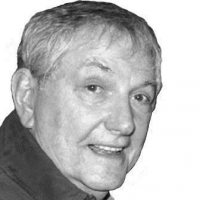 Arthur Hamilton is an American songwriter. He is best known for writing the song "Cry Me a River", first published in 1953, and recorded by Julie London and numerous other artists. Born: 1926 (age 93 years), Seattle, Washington, United States
Arthur Hamilton is an American songwriter. He is best known for writing the song "Cry Me a River", first published in 1953, and recorded by Julie London and numerous other artists. Born: 1926 (age 93 years), Seattle, Washington, United StatesGenre: Jazz Nominations: Academy Award for Best Original Song, MORE Albums: Turn On, Tune In - Sounds Of The Best T.V. Adverts Of
Search for Free Sheet Music
You can make a search through the entire collection of sheets.
You can make a search through the entire collection of sheets.


































